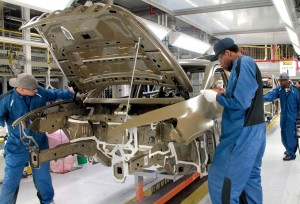
The demand for Jeep Cherokees and Wranglers has forced Chrysler to add as many as 1,000 part-time employees.
The fits and starts of production of the new Jeep Cherokee in Toledo have now morphed into a torrent of SUVs that in conjunction with a similar demand for the Wrangler have forced the maker to add 1,000 part-time employees.
The Toledo, Ohio plant where the two vehicles are built are adding these additional workers because the full-time employees are working as much as 60 hours a week, according to published reports.
“Our people have been working a tremendous amount of hours,” plant manager Chuck Padden told the Toledo Blade. “To get them more time off is important to us, to make sure they’re refreshed, and can work safely.”
Chrysler has hired 380 temporary part-time employees this year. They work between 10 and 30 hours a week, but they are paid $15.78 an hour, which is the same as new full-time hires. They also get a reduced benefits package, which includes health insurance.
(Toyota, Honda gain ground in China. For more, Click Here.)
The extra help allows the plant to run on Saturdays. The goal is to build 2,000 vehicles each day at the facility and right now the complex produces 1,830: 990 Cherokees and 840 Wranglers.
(Click Here to get the details on how Audi has surged to the top of the luxury heap.)
While many times in the past the UAW has registered unhappiness with adding part-time or temporary employees, in this case. However, the Toledo plant has converted about 50 of the part-timers to full time. Aside from the potential opportunity to add to its shrinking ranks, the part-timers afford the regulars a chance to enjoy a better work-life balance.
(To see the latest on the GM ignition switch recall, Click Here.)
“They’ve worked through the Christmas shutdown the last couple years; they’ve worked through summer shutdowns,” said Bruce Baumhower, president of United Auto Workers Local 12, to the Blade. “Summertime’s coming; they’ve got kids in Little League and other things. They’ve done an unbelievable job of carrying the load.”
Jeep sold 11,795 Cherokees in the U.S. and 10,640 Wranglers in February.

Part time employees are often a bad deal to save on essential employee benefits.